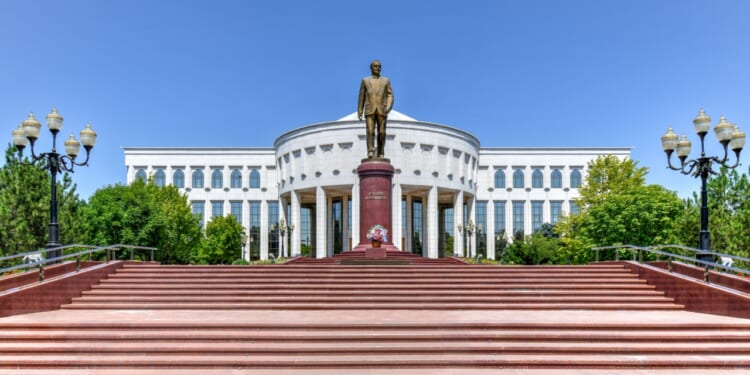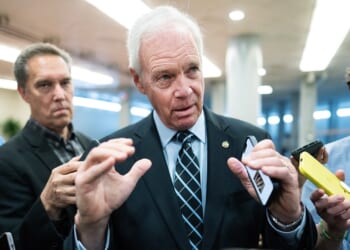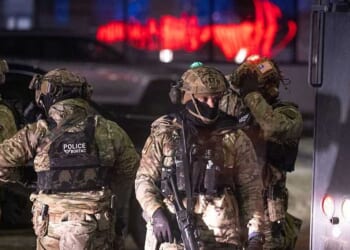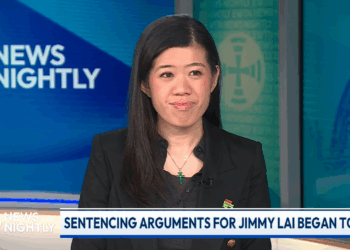Directly to Afghanistan’s north, Uzbekistan has emerged as Central Asia’s very own “Taliban whisperer.”
Since the Taliban reconquered Afghanistan in August 2021, the Central Asian republics have been required to reassess and adapt their foreign policy frameworks in response to a fundamentally transformed geopolitical landscape. The chaotic and botched withdrawal of NATO forces marked the beginning of a new era of uncertainty for Afghanistan’s Central Asian neighbors, which have had to confront a complex array of significant security, political, and economic challenges, from countering terrorist threats to stemming the flows of narcotics and managing border security.
These regional countries have engaged the Taliban both pragmatically and proactively since the Islamic Emirate’s return to power just over four years ago—not out of ideological affinity, but from a sober recognition that the Taliban’s rule is unlikely to collapse in the foreseeable future. This approach has led regional governments to accommodate the new Afghan regime cautiously.
Uzbekistan at the Center: Strategic Geography and Post-2021 Diplomacy
As the only country bordering all other Central Asian republics as well as Afghanistan, Uzbekistan sits at the epicenter of regional geopolitics. Since President Shavkat Mirziyoyev came to power in 2016, following Islam Karimov’s 25-year rule, Tashkent has adopted a more outward-facing foreign policy, focusing on economic openness and regional integration—an orientation that informs its pragmatic approach to the Taliban.
Of all the Central Asian states, Uzbekistan has taken the lead in engaging post-US Afghanistan. In the month following the Taliban’s return to power in 2021, Tashkent acted swiftly, hosting Taliban officials such as Acting Deputy Prime Minister Mawlawi Abdul Salam Hanafi and signing a protocol to expand economic cooperation and enhance border security.
In August 2024, Uzbek Prime Minister Abdulla Aripov became the highest-ranking foreign official to visit Taliban-controlled Afghanistan—a symbolic move that marked Tashkent’s intention to shape, rather than merely adapt to, the new regional order. What began as bilateral outreach has since evolved into broader regional initiatives, reflecting Uzbekistan’s strategic ambition to transform Afghanistan from a security risk into a corridor for trade and connectivity.
This sustained engagement rests on calculated expectations that the Islamic Emirate, however imperfect, may still be able to deliver a baseline of security and stability necessary for cross-border infrastructure and trade. For Uzbekistan, Afghanistan’s fate is not a distant concern but a key variable in its own development trajectory. Without progress on governance, infrastructure, and connectivity in Afghanistan, Tashkent’s broader economic vision becomes significantly harder to realize.
“During the [Mirziyoyev] presidency,” Dr. Akram Umarov, First Vice-Rector at the University of World Economy and Diplomacy, told this author, “the approach [of Uzbekistan] to Afghanistan changed in terms of seeing Afghanistan not just as a security threat, but also trying to de-securitize our vision and perception of Afghanistan, and also paying more attention to economic outputs from this cooperation.”
Tashkent’s engagement with the Taliban is not an ideological endorsement, but a pragmatic attempt to shape its immediate environment in a way that supports long-term national interests.
The Trans-Afghan Railway: From Ambition to Strategic Leverage
This strategic outlook gained traction in July 2023, when Uzbekistan, Afghanistan, and Pakistan signed a trilateral agreement to develop the Trans-Afghan Railway—a $4.6 billion infrastructure initiative aimed at connecting Central Asia with Pakistan’s seaports via a 650-kilometer rail line. Starting in Termez on the Afghan-Uzbek border, the railway is planned to run through Mazar-i-Sharif and Logar before entering Pakistan and eventually linking to the port city of Karachi.
For Uzbekistan—a doubly landlocked country—this initiative represents a vital step toward securing access to maritime trade routes, reducing transport costs, and positioning itself as a regional transit hub. More than a logistical upgrade, the project reflects a larger effort to transform Afghanistan from a zone of instability into a transit corridor between Northern Eurasia and the Indian Ocean.
Crucially, the project also signifies a shift in regional diplomacy. By prioritizing infrastructure and economic cooperation over political isolation, Uzbekistan and its partners are demonstrating a functional, forward-looking approach to Afghanistan. This pragmatism reinforces Uzbekistan’s emergence as a regional actor capable of balancing strategic risk with long-term opportunity.
The Trans-Afghan Railway also aligns with multiple regional initiatives, including China’s Belt and Road Initiative (BRI) and Pakistan’s China-Pakistan Economic Corridor (CPEC), while helping Central Asian states reduce their reliance on northern routes through Russia. As economic interdependence deepens, the railway could also serve as a soft-power tool for conflict prevention and regional stability.
Still, significant obstacles remain. Security risks inside Afghanistan, including threats from militant groups, pose ongoing challenges. The project’s viability also depends on stable governance in Afghanistan and sustained international investment. Yet, despite these headwinds, the agreement marks a bold pivot toward a more connected, resilient regional order—one in which infrastructure becomes a foundation for diplomacy, development, and peace.
As Dr. Umarov emphasized, “paying more attention to economic outputs” is now central to Uzbekistan’s recalibrated approach—reflected in its decision to engage the Taliban not as a preferred partner, but as a necessary one in the pursuit of regional stability and integration.
“Tashkent, taking a pragmatic approach, wants to turn Afghanistan into a bridge for broader regional integration through a combination of humanitarian aid, economic cooperation, and infrastructure development,” said Farzad Ramezani Bonesh, a senior researcher on Afghanistan, in an interview with this author.
The Case for Afghan-Uzbek Counterterrorism Cooperation
There are important security dimensions to Uzbekistan’s foreign policy toward post-occupation Afghanistan. In the face of persistent threats from transnational jihadist groups such as Islamic State-Khorasan Province (ISKP) and other violent extremist groups, Uzbekistan understands the nature of these organizations. With ISKP maintaining a presence in Afghanistan and Pakistan, and having its sights set on the Central Asian republics, Russia, and Iran, officials in Tashkent’s stance toward the Taliban is greatly informed by its counterterrorism needs.
Uzbekistan has come to view the Islamic Emirate as a potential bulwark against the spread of extremist ideologies and insurgent activity across the post-Soviet space. From this perspective, Uzbek policymakers increasingly judge that a functioning, albeit far from ideal, authority in Kabul offers a more effective barrier to regional destabilization than the alternative—a power vacuum ripe for exploitation by jihadist actors.
“As much as we don’t like the Taliban, there is a rationale for engagement with the Taliban state…If you are there in the region, your collective problem requires collective solutions, which means that if the problems that you have are shared with Afghanistan you need to have a way to deal with the Taliban to address these problems. It’s as simple as that,” Dr. Luca Anceschi, a Professor of Eurasian Studies at the University of Glasgow, explained in an interview.
Dr. Umarov similarly assesses that not working with the Taliban in the struggle against ISKP is simply not an option for Tashkent to consider. “For Central Asian countries it’s truly important to have some counterparts on the other side of the river in Afghanistan who can be collaborating on counterterrorism issues. For now, it’s the Taliban movement which has power and authority to de facto run the country, so this is the group you should deal with in all security issues,” he told this author.
De Facto Taliban Recognition
Uzbekistan has positioned itself as a diplomatic bridge between Taliban-ruled Afghanistan and the broader international community. Demonstrating its commitment to regional engagement, Tashkent hosted the fourth meeting of Afghanistan’s neighboring countries in Samarkand in April 2023, where foreign ministers convened to address shared concerns regarding Afghanistan’s future.
This diplomatic momentum continued in 2024 with Aripov’s historic visit to Kabul and into February 2025, when a high-level Taliban delegation, led by Deputy Prime Minister for Economic Affairs Mullah Abdul Ghani Baradar, visited Uzbekistan to advance discussions on deepening economic integration, expanding bilateral trade, and enhancing transportation connectivity.
During the visit, Uzbek officials reaffirmed their commitment to completing the Termez International Trade Center, located along the Afghan-Uzbek border. In a further gesture of economic openness, Tashkent also announced the introduction of a 15-day visa-free regime for Afghan nationals. Together, these moves underscore Uzbekistan’s ambition to cement its role as a central conduit for regional commerce and diplomacy, while pragmatically engaging with Afghanistan’s de facto authorities to shape the contours of post-conflict regional integration.
On August 17, the Taliban finalized contracts worth approximately $243 million with Uzbekistan to advance four critical electricity transmission and distribution projects. Deputy Prime Minister Baradar and Uzbek energy minister Jurabek Mirzamakhmudov attended the signing ceremony in Kabul. Upon completion—anticipated within 18 months—this investment is expected to enable Afghanistan to import between 800 and 1,000 MW of electricity annually. Currently, Afghanistan remains heavily reliant on electricity imports, with only about 40 percent of its population having access to power.
Looking ahead, Uzbekistan’s leadership will remain committed to engaging the Taliban even if Tashkent is in no rush to formally recognize the Kabul regime as Russia did in early July. The reality is that Uzbekistan and its fellow Central Asian republics already have unofficial relationships with the Taliban that have become stronger since August 2021, which raises questions about what could be gained from officially extending recognition to the Islamic Emirate.
Before Uzbekistan made any bold moves regarding Taliban recognition, it would likely consult with its neighbors and multilateral organizations, such as the Shanghai Cooperation Organization. Uzbekistan appears to be keen on approaching post-US Afghanistan through multilateral channels, in which Tashkent takes into consideration the interests of all neighboring states, as well as those of the major global powers.
As Dr. Anceschi noted, official recognition of the Taliban on the part of Central Asian states “may just be the conclusion of relationships that are strong.” He told this author that he expects much more Afghan-Uzbek engagement in the years ahead, irrespective of how Tashkent approaches the question of official recognition.
“In general, I personally think that formal recognition itself is quite tricky stuff. For Central Asian countries, all of them are very actively and heavily engaging with Taliban. Isn’t it some kind of recognition? Even without making some formal statement, they are very closely engaging with the Taliban,” Dr. Umarov told this author.
Indeed, policymakers in Tashkent are increasingly cognizant of the Taliban’s expanding influence across Central Asia, particularly in matters of regional security and economic connectivity, leaving them with few viable strategic alternatives. In this context, pragmatic engagement with the Islamic Emirate has evolved from a discretionary policy option into a geopolitical necessity for Uzbekistan.
Through sustained diplomatic outreach, infrastructure investment, the development of transit corridors and railway linkages, as well as targeted counterterrorism cooperation, Uzbekistan is emerging as a central actor in shaping Central Asia’s collective response to post-US Afghanistan.
About the Author: Giorgio Cafiero
Giorgio Cafiero is the CEO of Gulf State Analytics, an Adjunct Assistant Professor at Georgetown University, and an Adjunct Fellow at the American Security Project. He is a frequent contributor to Al Jazeera, Gulf International Forum, The New Arab, Responsible Statecraft, Stimson Center, and Amwaj.Media. Throughout Mr. Cafiero’s career, he has consulted many public and private sector entities, briefed diplomats of various countries on Gulf affairs, and worked as a subject matter expert for multinational law firms. Mr. Cafiero holds an M.A. in International Relations from the University of San Diego. Find him on X: @GiorgioCafiero.
Image: Felix Lipov / Shutterstock.com.


















